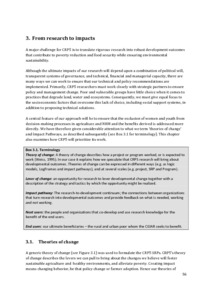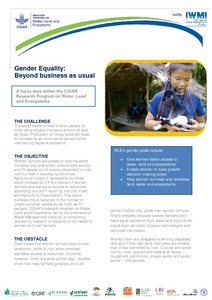Location
The International Water Management Institute (IWMI) is a non-profit, scientific research organization focusing on the sustainable use of water and land resources in developing countries. It is headquartered in Colombo, Sri Lanka, with regional offices across Asia and Africa. IWMI works in partnership with governments, civil society and the private sector to develop scalable agricultural water management solutions that have a real impact on poverty reduction, food security and ecosystem health. IWMI is a member of CGIAR, a global research partnership for a food-secure future.
IWMI’s Mission is to provide evidence-based solutions to sustainably manage water and land resources for food security, people’s livelihoods and the environment.
IWMI’s Vision, as reflected in the Strategy 2014-2018, is ‘a water-secure world’. IWMI targets water and land management challenges faced by poor communities in the developing countries, and through this contributes towards the achievement of the United Nations Millennium Development Goals (MDGs) of reducing poverty and hunger, and maintaining a sustainable environment. These are also the goals of CGIAR.
IWMI works through collaborative research with many partners in the North and South, and targets policymakers, development agencies, individual farmers and private sector organizations.
Resources
Displaying 266 - 270 of 959Evaluation rapide de la disponibilite en eau et des technologies appropriees pour la petite agriculture: directives pour les acteurs de terrain. In French
Les restrictions sur l’acces a l’eau sont la principale raison des difficultes qu’eprouvent des millions d’agriculteurs pauvres a faire pousser suffisamment de cultures alimentaires et commerciales pour ameliorer leurs conditions de vie. Les organismes du secteur prive, les organisations de la societe civile et les bailleurs de fonds qui cherchent a ameliorer l’acces des petits agriculteurs aux ressources en eau sont confrontes a une insuffisance des donnees sur l’emplacement et l’accessibilite des ressources en eau.
Evaluating the flow regulating functions of natural ecosystems in the Zambezi River Basin
By affecting evapotranspiration and influencing how water is routed and stored in a basin, forests, wetlands and floodplains play a crucial role in the hydrological cycle. Although they are widely attributed a major role in regulating flows (i.e., both attenuating floods and maintaining flow during dry periods), these services are rarely factored into the planning and management of water resources. One reason for the failure to include them is lack of understanding. Very often the extent to which natural regulating functions really occur is unclear.
Facilitating outcomes: multi-stakeholder processes for influencing policy change on urban agriculture in selected West African and South Asian cities
The Multi-stakeholder Policy Formulation and Action Planning approach was applied in the context of a multi-city study to influence and/or change policies that govern urban agriculture practices in three African and two Asian countries. Although the approach was successful and resulted in remarkable outcomes, it showed space for improvement to facilitate its application.







